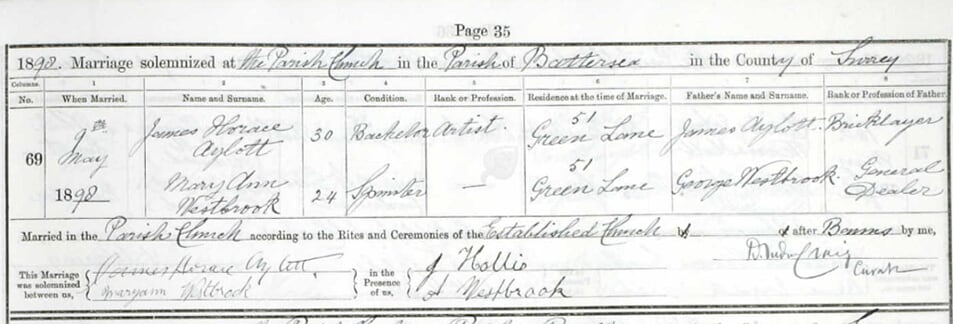James H. McKenzie (1862-1952): Education and Schooling
‘I had never been sent to school!’
James H. McKenzie pg. 54
James H. McKenzie’s words address the frustration that he felt after being deprived of schooling and an education during his childhood. Evidently throughout his handwritten memoir James illuminates how the misfortune of his parents’ deaths when he was six was a defining moment in his life, as it consequently resulted in an unsettled childhood in which he was never able to find stability and have the privilege of receiving an education: ‘through being bandied out to one relative to the other, this retarded my education’ (54). James openly blames the constant movement between relatives as a child as being one of the main reasons why he never was able to gain a formal education.
Although James initially appeared settled when living with his grandmother in Battersea, this was only for a brief time before her death. Following her death James believed that he became the unwanted orphan, as once he was passed into the care of other relatives, they disregarded the importance of his education and so he became driven to seek employment and earn a wage for himself. While James had a disrupted childhood because of his uprooted situation, he further acknowledges how in 1879 ‘board schools were just being talked about’ (54) and how by that point he was a young adult who ‘could neither read or write’ (54). Although James was not formally educated, he never let his illiteracy define him, as he consistently strove to better himself and to work to the best of his ability.

This image of a circus caravan helps to emphasise the extent to which James’ teaching space was different from a typical classroom environment.
Credit – Wikimedia Commons
Once James joins the circus, there is a sense that he was respected and treated equally, as he was never categorised as illiterate or stupid by his circus cohort. David Vincent offers insight into how literary and illiterate individuals co-existed within society and how there was no definitive stigma attached to illiteracy:
‘Few people lived alone in the eighteenth and nineteenth centuries, and fewer still lacked either relatives or close friends. In households, in the informal relationships in the neighbourhood, literate and illiterate were everywhere in each other’s company’ (Vincent, 23).

Credit – Ancestry.co.uk
In the circus, James became part of a collective identity, in which he was free from discrimination and embraced for the skills and abilities that he did have. The circus for James symbolised a solid family unit, in which every individual was supported by each other and encouraged to pursue desires that they wanted to achieve.
Although James did not necessarily need to be literate while working in the circus, there is a sense that he wanted to learn to read and write, as this was something that would give him independence from having to rely on other people to help him understand things. In his memoir, James reminiscences on how his education and schooling was unusual and not the typical classroom scenario, as he was taught by a fellow performer to read and write in his caravan: ‘In the caravan was a library … I had my education from him, he was persistent I should read, and write, in any spare moments he concentrated with [the] insistence of me learning’ (83). It is evident that James greatly admired his teacher, as he had given up his own time for James’ benefit. The mutual care exchanged between members of the circus is key to how James developed as an adult, as he became a person that wanted to share his gifts with others and bring them joy and hope.
James states that he became an ‘apt pupil’ and by the end of the circus season was ‘well on the way to [be able to] read and write’ (83). It is significant that James eventually learnt to read and write as this informed the career direction that he went in, as he became focused on working on a ‘Dickens Gallery’ and constructed a ‘Peggotty Hut’. From observing his marriage certificate and his memoir, we can see that James became an astute and educated man in his own right, as his concise and clear writing is evidence of his dedication to learning.
Bibliography:
‘James H. McKenzie’ in John Burnett, David Vincent and David Mayall (eds) The Autobiography of the Working Class: An Annotated, Critical Bibliography 1790-1945, 3 vols. (Brighton: Harvester, 1984, 1987, 1989): 1:473
McKenzie, James H. ‘Strange Truth. The Autobiography of a Circus, Showman, Stage and Exhibition Man’, Burnett Archive of Working Class Autobiographies, University of Brunel Library, Special Collection Library, 1:473
Vincent, David. Literacy and Popular Culture: England 1750-1914. Cambridge: Cambridge UP, 1989, pp. 18-25.
Proof read by Sera – Click here to read Sera’s blog post on Education
Previous Post: Home & Family
Next Post: Life & Labour [Part 1]

Leave a Reply